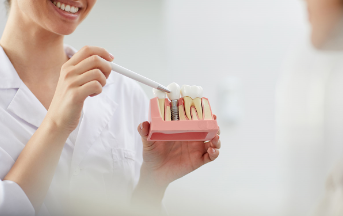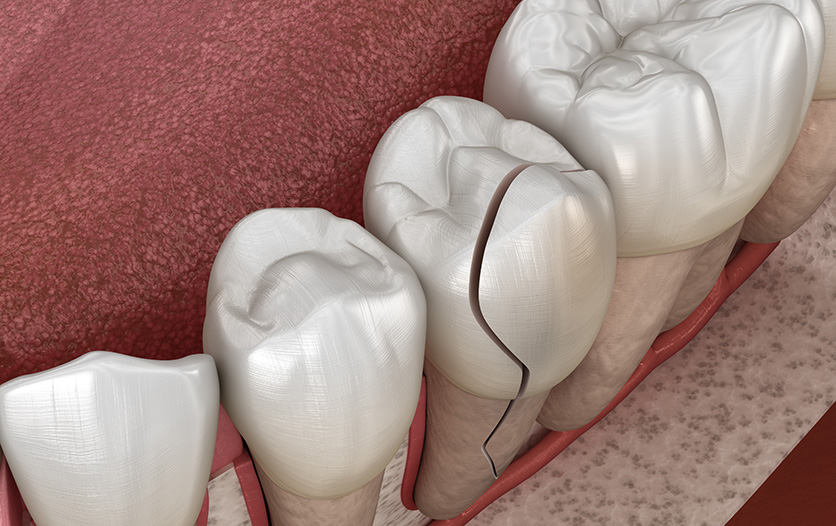
What Are Dental Implants? A Guide
A dental implant, more formally known as an endosseous root-form implant, is a procedure in which your teeth roots are replaced. Dental implants are made of titanium and shaped to fit in place of a natural tooth root. Dental implants are an effective and long-lasting solution for those who suffer from missing teeth, failing teeth, or chronic dental problems.
If you are dealing with dental issues, a dental implant may prove the best option in restoring your mouth and freeing you of pain.
Problems with roots can be painful and result in missing teeth.
The root is the part of a tooth that exists below the gumline. Roots hold teeth in place. Individuals with teeth health problems can experience root decay. Root decay can cause teeth to fall out and can result in mouth pain.
Unlike a broken bone, teeth do not repair themselves. Once you lose an adult tooth, it will not regrow. Even if teeth do not fall out, unhealthy roots will only continue to worsen. Left untreated, teeth will likely begin to fall out over time.
If you have teeth with decayed roots, one of the only restorative options you have is dental implants.
A titanium dental implant is surgically implanted and mimics the function of a natural tooth root.
Titanium dental implants can restore your mouth to health and help alleviate pain.
There are three components of a dental implant:
- The implant: The implant is a titanium screw that is the shape and size of a normal root. This permanently attaches to your jaw, in the same place as your natural root would be. Over time, the titanium implant actually fuses to the jawbone.
- The abutment: A permanent support, attached to the top of the implant, that holds a tooth or teeth in the correct place.
- The crown: The crown is a prosthetic tooth that affixes to the top of the implant. It is usually made of zirconium or porcelain. The crown is durable and provides a natural look.
Dental implants can be used to replace a single tooth or multiple teeth. Your dentist and oral surgeon will help guide you through this process, including whether this is the right procedure for you.
Talk to your dental provider about the benefits and risks of a dental implant to decide if this is the right procedure for you.
Dental implants are not the right procedure for everyone. You should first talk to your dentist about your options. Your dentist and oral surgeons will consider your overall health, how long the procedure may take to heal, and if the implants will successfully fuse to your jawbone.
If you are cleared for the procedure, the healing process can take several months. This is because of osseointegration, which is the process of your jawbone fusing with the metal implants. During this time, the implant(s) will be fitted with abutments. A dentist or prosthodontist can then bond the crown to the abutment.
After the procedure, be sure to follow the recommended care instructions given to you by your dental provider. Properly cleaning your implant(s) and the surrounding teeth can make a big difference in the long-term success of the procedure and the overall health of your mouth.
You may feel general mouth pain and experience slight swelling in the days after a dental implant procedure. More serious complications, such as infection, are rare.
During a dental implant surgery, your oral surgeon will use a local anesthetic to numb the area. You should not feel pain during the procedure.
You may feel some pain in your mouth after the procedure. But this pain is often manageable, and your doctor may direct you to take over-the-counter pain reliever for any discomfort. Slight swelling may also occur.
More severe post-implant complications include bleeding and infection. Infection at the site of an implant is a condition known as peri-implatitis. Symptoms of peri-implatitis are very similar to gum disease. Bacteria can form around the implant and cause swelling, bleeding, and discomfort. It is important to report any such symptoms to your dentist. Left untreated, peri-implatitis can result in the removal of the implant.
Be sure to talk with your dental provider so you know what to expect in the aftermath of a dental implant. Contact your dentist if pain becomes unmanageable after the procedure.
Here are six potential benefits of a successful dental implant procedure.
Many people that seek out dental implants experience tooth and mouth pain, which can affect everyday life. Something as simple as chewing on food can become difficult for those with teeth issues.
Dental implants can help:
- Restore your ability to chew
- Restore the appearance of your teeth
- Prevent your jawbone from shrinking due to bone loss
- Preserves the overall health of surrounding teeth
- Keep healthy teeth from shifting
- Improve overall quality of life
If dental implants are not right for you, there are alternatives.
When it comes to tooth replacement options, many dentists and patients gravitate toward dental implants. But dental implants are not always the best choice. Again, your dental provider will evaluate your teeth and help you make the right choice.
Here are some alternatives to dental implants that your dentist may suggest:
- Full Mouth Dentures: Most people are probably familiar with dentures (and most probably associate them with their grandparents!). Full mouth dentures are a good choice for those who have no teeth, or who will be removing all remaining teeth. Dentures are removable and easy to clean but may not feel natural. And it can be more difficult to eat certain foods because of the material they are made of.
- Partial Dentures: Partial dentures can be used when you still have some healthy teeth. You may be missing just two or three teeth, in which case a partial denture is a suitable fix. These are also removable and easy to clean but come with the same drawbacks of full mouth dentures.
- Fixed Bridges: Fixed bridges are like dentures, only they are not removable. This means that they look and may feel more like a normal tooth. But they can be more difficult to clean and may cause damage to other teeth nearby.
A dental implant procedure can replace missing teeth and get rid of mouth pain.
If you have missing teeth, you have options. A dental implant procedure can prove to be the ideal solution. Be sure to discuss your treatment options with your dentist!




